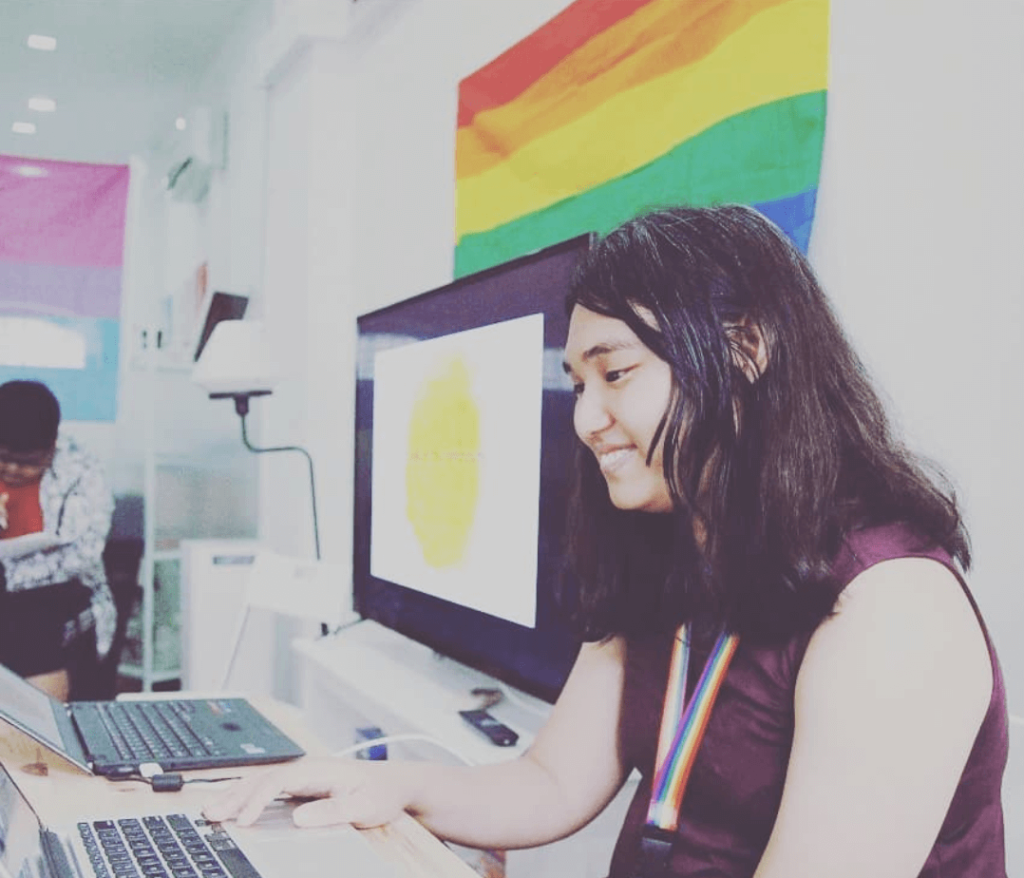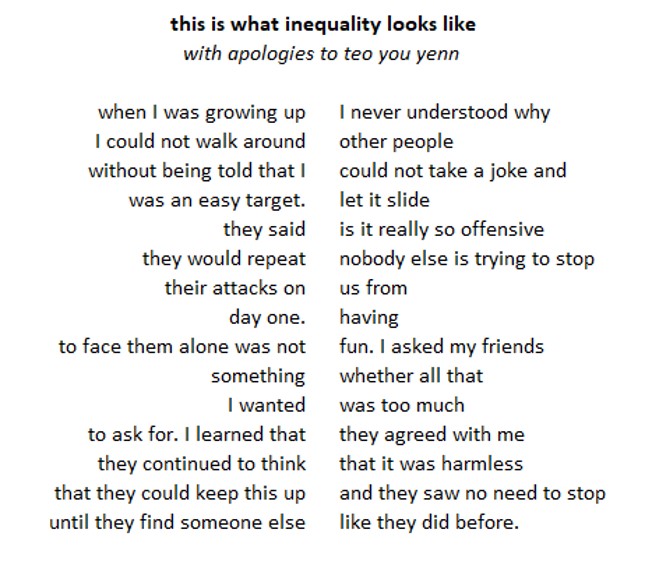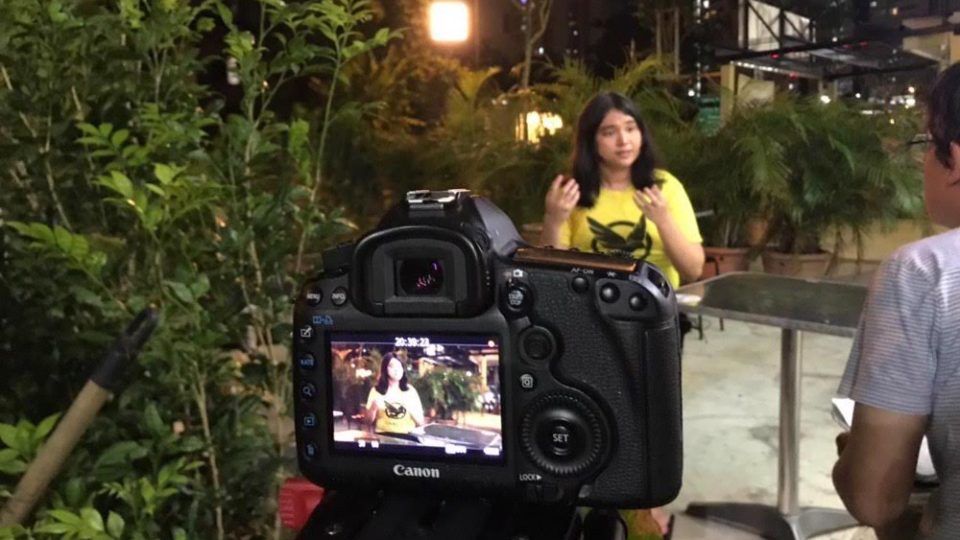In the countdown to our next Coconuts Colloquium — the “Anti-Manel” — happening at The Projector’s Intermission Bar tomorrow evening, we’d like to give a closer look into the experience and expertise of each of our featured panelists. It’s part origin story, part elucidation on why this person rocks (and can be counted on to serve some realness in our roundtable discussion).
Meet Carissa Cheow, a political science and public policy student and LGBTQ advocate. She is a member of the Inter-University LGBT Network and co-founder of a university group called transNUS. She is also currently working on her first collection of poems, and in 2020, will be starting graduate school at the Lee Kuan Yew School of Public Policy.
Editor’s Note: We didn’t set out to run Carissa’s “Close-Up” in this Q&A format, but as you’ll see — she tells such a compelling story with candor that we decided to keep the text in her original voice.
Please tell us about your personal journey — what notable event(s) led you to where you are today?
Growing up, I knew I didn’t blend in very well with my male peers, but I never thought too much about it. It was only after I enrolled in two (ostensibly) all-boys’ schools that everyone around me noticed how much I stuck out like a sore thumb — so much so I had my uniform stripped and my belongings thrown around in the classroom simply because I was an easy target for being different. This experience prompted me to ask: Why would anyone hurt another person if it is simply easier to love another person?
In secondary two, the trauma from this inescapable abuse day in day out whenever I went to school caused me to dread going to school, and affected my academic performance at that time. I realized that I could not wait for someone to create a society I could finally feel at home in; at fourteen I decided that I had to proactively try to create a society where no one would ever have to go through what I went through. I started reading up on politics, philosophy, economics, sociology, trying to find answers as to why people would behave this way and how we can find a better way to live.

[cont.] Ironically, this further postponed my coming out journey, because my attention became directed outwards instead! That and I’m (for the most part) attracted to other girls more than guys, so growing up in all-boys’ schools meant that I could neither relate to the typical straight male experience, nor could I identify with the only other visible alternative at that time, my gay male peers — because I couldn’t quite relate to men, and likewise wasn’t very attracted to them.
It took me until I was 22 to come to the realization that I was certain I had to transition for my own sake and do something to care for myself for once in a lifetime of being told I had to put everyone first and my own needs last: I saw my peers around me enter university, and I was terrified at the idea of going to university pretending to be a man for another four, five years. I’m thankful I stopped to remove the rock from my shoe so I could continue to run along on my journey forward.
How did you connect with the transgender community in Singapore?
My first encounter with the trans community in Singapore was arguably when I started writing poetry more actively to articulate and come to terms with my own gender identity, and met a few other trans writers. From there, I discovered the website transgendersg.com, which made things so much easier for me, and Trans*it, the trans group run by The Purple Alliance, and with the help of friends I was able to start my transition by the time I entered NUS.
Tell us more about your advocacy work as part of the Inter-University LGBT Network, and the NUS-based trans group that you co-founded. What was the impetus for creating your own group?
I joined the Inter-University LGBT Network in 2017 — two months before I came out to family and friends — because I wanted to make campuses more inclusive for those who would come after me. Since then, the Network has really come a very long way — we recently released a video on International Day Against Homophobia And Transphobia, and held a series of workshops on effective allyship, and it has been really heartening to know that more and more queer students and allies are forming their own queer community groups in the newer universities!
In 2018, I co-founded an NUS-based trans group, transNUS, with another dear friend of mine, initially prompted by the fact that we were both made to take rather inconvenient detour arrangements to use the only neutral bathroom in our residential colleges (I had to travel nine floors down each time I merely wanted to relieve myself, let alone bathe!) because “cis people might be uncomfortable sharing a bathroom with us trans people,” according to some of the staff. I discovered that the NUS Code of Student Conduct actually lists discrimination on the basis of “sex, gender identity, and sexual orientation” as a sexual misconduct offense, but somehow we were not covered even with this.
It took us another eight months for transNUS to become active — in April this year, the Monica Baey sexual harassment case broke into the news and NUS had to respond by taking action to make campuses safer for us students. However, a few of the measures proposed would endanger trans students by potentially locking us out of the bathrooms of our gender. Over a month, the transNUS community (which has over thirty current students, incoming students, alumni, and staff combined and counting) came together to hold a series of focus group discussions and put together a thirty-page report documenting our experiences and recommendations. If we didn’t represent ourselves, who else could we count on to represent us? This was precisely why transNUS was formed.
What kind of poetry do you write, and what kinds of themes do you explore in your creative writing?
I’d describe my poetry as the summation of the saying “the personal is political, and the political is personal.” I’m currently putting together my first full-length collection of poems titled “you need a very small space to read these poems” — my titular poem in the collection won 2nd place in last year’s National Poetry Competition.
Here’s a sample poem I wrote, from the perspective of a harassment survivor on one side and the harasser on the other:

You’ve clearly got a passion for political science and public policy — do you aim to work in these areas in the future? If so, in what capacity?
Given my experiences, I entered the field of political science at the unusual age of fifteen, so this year marks my tenth year in the discipline! My work in political science spans across multiple areas — amongst other things, I have a personal project to compile a database of the past three Malaysian electoral cycles all the way down to the polling district level, where you can truly see past the common myths and appreciate how plural societies can actually be even more inclusive and need not be divided. I’m also looking to do a political preferences census of the Singapore population — wish me luck!
I’m currently working on a new theoretical framework that conceptualizes politics as positional space defined by horizontal difference (diversity) and vertical difference (inequality), and moving forward I intend to pioneer a new sub-discipline to be known as interpersonal politics — the workings of power at an interpersonal level. My hope is to enter academia and do research and teach in either a public university or a think-tank for the first ten to fifteen years or so upon obtaining my PhD, and once I obtain tenure I might opt to broaden my choices for what kinds of capacity I would be involved in politically. This will depend on what the situation best requires.
Read more:
Colloquium Close-Up: June Chua, founder of The T Project
Colloquium Close-Up: Pat Law, founder of GOODSTUPH
Colloquium Close-Up: Becca D’Bus




